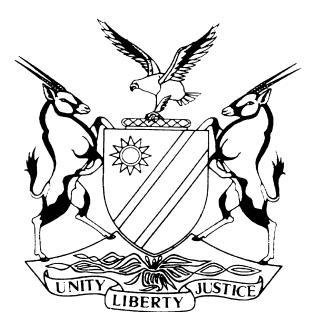 REPUBLIC OF NAMIBIA
REPUBLIC OF NAMIBIA

HIGH COURT OF NAMIBIA MAIN DIVISION, WINDHOEK
RULING ON ABSOLUTION FROM THE INSTANCE
Case no: I 131/2015
In the matter between:
FRANS KEJARUKUA PLAINTIFF
and
UAZEUA VEZIRUAPI DEFENDANT
Neutral citation: Kejarukua v Veziruapi (I 131/2015) [2018] NAHCMD 161 (07 June 2018)
Coram: USIKU, J
Heard on: 12 February 2018
Delivered: 07 June 2018

ORDER

1. Absolution from the instance is granted in favour of the Defendant.
2. The Plaintiff is ordered to pay the costs of suit of the Defendant.
3. The matter is removed from the roll and regarded finalized.

REASONS IN TERMS OF PRACTICE DIRECTIONS 61 (9)

Introduction
[1] Presently serving before court is an application for absolution from the instance, launched by the Defendant after the Plaintiff closed his case. The summary of the evidence adduced by the Plaintiff is as follows: during 2004, the Plaintiff advanced N$ 5000.00 to the Defendant for the Defendant to pay her house instalments at NHE. The Plaintiff in acting as he did, helped the Defendant because the Plaintiff knew the Defendant’s mother.
[2] Subsequently the Defendant asked the Plaintiff to continue paying for her instalments at NHE as the Defendant was unemployed. According to the Plaintiff, the Defendant promised to repay the amounts paid by the Plaintiff, once she finds employment.
[3] Furthermore, according to the Plaintiff, the Defendant pledged that, should she be unable to repay as aforesaid, she would transfer ownership in the immovable property, (namely: Erf No. 2788, Otjomuise, situate in the Municipality of Windhoek), into the name of the Plaintiff.
[4] According to the Plaintiff, the Plaintiff considered the aforesaid terms of the oral agreement ‘a good investment’ and he agreed to continue paying the instalments in respect of the aforesaid Erf, to NHE, on behalf of the Defendant.
[5] During 2011, a written agreement, in a form of an acknowledgement of debt, was prepared and signed by the Plaintiff and the Defendant. At trial, this court declined to accept in evidence the purported acknowledgement of debt on the ground that the same was not stamped in terms of the Stamp Duties Act, 15 of 1993 and no reasonable explanation was furnished as to why it was not stamped timeously. The acknowledgement of debt document and the contents thereof was therefore refused to be admitted in evidence.
[6] After the signing of the aforesaid acknowledgment of debt, the Plaintiff further testified, the parties agreed that since the Defendant was unemployed the Plaintiff would continue making payments to NHE. The Plaintiff continued making such payments as he did not want to lose his ‘investment’.
[7] The Defendant has not paid any amount to the Plaintiff and therefore the Plaintiff now claims a total amount of N$ 157 533.20, representing the total amount he paid in respect of the agreement aforesaid.
Substance of the evidence by the Plaintiff
[8] It appears to me that, according to the evidence of the Plaintiff, the following were the terms of contract between the parties:
That the Plaintiff pays monthly instalments to NHE, in respect of Erf No. 2788, Otjomuise;
The Defendant shall repay the amounts paid by the Plaintiff on condition that the Defendant had secured employment;
Should the Defendant fail to secure employment or otherwise fail to repay, the Defendant shall transfer ownership on the Erf in the name of the Plaintiff.
[9] As outlined above, the Plaintiff now claims for the payment of the amount of N$ 157 533.20 representing the total amount he paid in terms of the above agreement.
Test of absolution from the instance
[10] The question at this stage is: whether the Plaintiff has adduced sufficient evidence upon which a reasonable court might find in his favour. It is common cause that the court would refuse to grant absolution if there are several reasonable inferences or possibilities arising out of the evidence, one of which favors the Plaintiff’s version of events.
Shortcomings of the Plaintiff’s evidence
[11] From the Plaintiff’s version as outlined above, the following are the salient terms of the agreement; namely:
Payment by the Plaintiff of the instalments to NHE, on behalf of the Defendant;
Repayment of the amounts paid by the Defendant, to the Plaintiff, once Defendant is employed.
[12] In his evidence and on the pleadings, the Plaintiff did not allege that the Defendant is now employed and therefore the debt is payable, in terms of the agreement as stated above.
[13] It is common cause that the Plaintiff is not claiming for the transfer of the ownership of the erf into his name, and therefore that aspect of the agreement is not relevant to the present proceedings. In any event had that been the case, then the provisions of section 1 of the Formalities in Respect of Contract of Sale of Land Act No. 71 of 1969 would have had to be considered.
Conclusion
[14] In light of the aforegoing, it follows that the Plaintiff has not furnished sufficient evidence upon which a reasonable court might find in his favour.
[15] That being the case, the application for absolution from the instance by the Defendant stands to succeed. The Defendant having succeeded, the costs shall follow the event.
__________
B Usiku, J
APPEARENCES:
PLAINTIFF: EE Coetzee
of Tjitemisa & Associates, Windhoek
DEFENDANT: S Rukoro
instructed by Directorate of Legal Aid, Windhoek